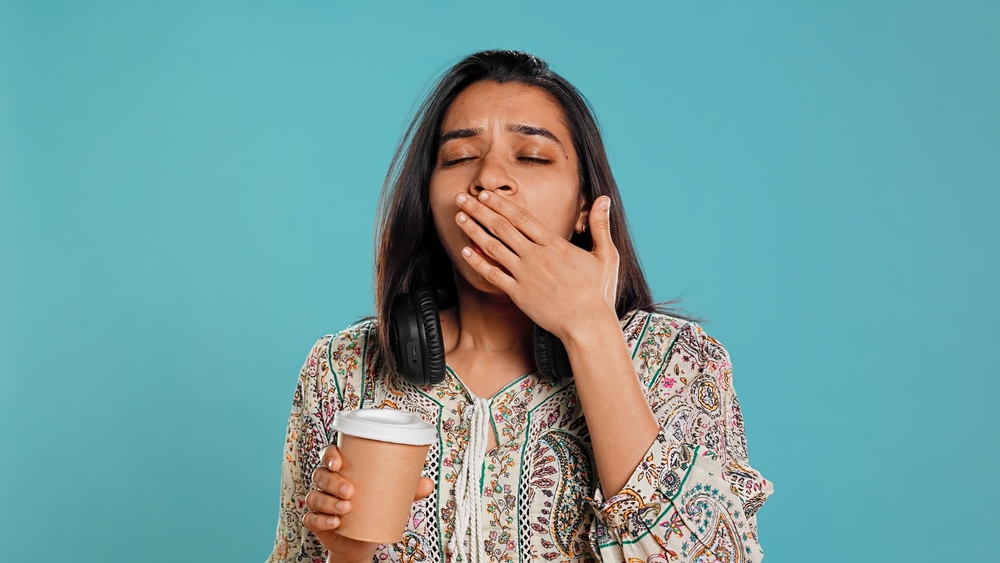Last Updated:
June 4th, 2025
Drowsiness and Lack of Energy Caused by Addiction
Feeling tired now and then is a part of life, especially during stressful or emotional times. But there’s a big difference between needing a nap and struggling to stay awake throughout the day. Drowsiness is one of the most common symptoms of addiction, but it’s often overlooked until it starts becoming disruptive or even dangerous. If you or someone you care about is always nodding off, zoning out or feeling constantly drained, it may be time to look at whether drug or alcohol addiction is the real cause.

What is drowsiness?
Drowsiness is a state of sleepiness that doesn’t let up, even when you’ve had enough rest. You might find yourself drifting off in the middle of the day, zoning out during conversations or struggling to keep your eyes open at work.
When drowsiness is caused by alcohol or drug addiction, it is often a sign that you are pushing your body and brain too far. In severe cases, drug drowsiness could be a sign of overdose that needs immediate medical attention.
Drowsiness can also come on during withdrawal when your body is adjusting to life without substances. It may last for a few days or become a chronic symptom if you don’t get professional detox support.
Drowsiness can make daily life very hard and even dangerous. You might lose track of conversations, become distant in relationships or even put your life at risk by falling asleep at the wheel. That is why drowsiness should always be taken seriously, especially when it seems to come out of nowhere or is tied to substance use.
How can addiction cause drowsiness?
Alcohol and drug drowsiness can become serious and recurring symptoms that affect every part of your daily life. Different substances affect your energy levels in different ways, but many cause deep, unshakeable fatigue.
Opioids, for instance, are known to cause extreme drowsiness. When someone is addicted, they may struggle to stay awake during the day or nod off mid-sentence. In some cases, drowsiness can be a symptom of a potentially fatal opioid overdose.
Alcohol can also bring on drowsiness, especially when consumed in large amounts or mixed with other drugs. Alcohol drowsiness can leave you feeling sleepy, sluggish or spaced out, and if you stop drinking suddenly, that drowsiness can flip to insomnia or extreme restlessness during withdrawal.
Benzodiazepines, prescribed for anxiety or sleep problems, are designed to cause sedation. But when misused, they can cause extreme tiredness, confusion or blackouts. The same is true for prescription sleeping pills, especially if you take them alongside other substances or at high doses.
Even stimulants like meth or cocaine, known for keeping people awake, can cause drug drowsiness when the high wears off and your body crashes.
If you’re feeling drowsy more often, especially after using substances, it may be time to consider whether you need professional rehab treatment.
What are some common signs of drowsiness to look out for?
Drowsiness can show up in different ways, especially when it’s linked to substance use or withdrawal. Some signs may seem small at first, but can quickly become dangerous. Here are some key drowsiness signs to keep an eye on:
The bottom line is that persistent drowsiness isn’t something to sleep off; it’s something to get checked out to keep yourself and others safe.
Why is drowsiness dangerous if left unaddressed?
Drowsiness might not feel urgent, but if it’s linked to addiction, it can become very dangerous very quickly. Falling asleep at the wheel, nodding off while cooking and other risky activities while drowsy can all lead to serious injury or worse. A huge number of traffic accidents are due to driving under the influence and falling asleep, which could have fatal consequences.
Another major concern is that substances that depress the central nervous system, like opioids, alcohol and some prescription medicines, can cause your heart rate and breathing to slow down dangerously. This can be especially serious during an overdose, where “nodding off” can lead to losing consciousness, choking on vomit or not waking up at all. You may also be too drowsy to recognise or react to other withdrawal symptoms, like the early signs of seizures that could become medical emergencies.
The bottom line is that persistent drowsiness isn’t something to sleep off, it’s something to get checked out to keep yourself and others safe.

What should I do if myself or a loved one is experiencing drowsiness from addiction?
If you or someone you love is struggling with ongoing drowsiness and you think it might be linked to drug or alcohol use, you may need professional help. Even small symptoms can be early warning signs of something more serious, and they can quickly spiral out of control. At Addiction Helper, we’re here to talk and offer honest advice and real support. Contact us today, and let’s figure out what’s causing your drowsiness and how to solve it together.
Our compassionate team are ready and available to take your call, and guide you towards lasting the lasting addiction recovery you deserve.

